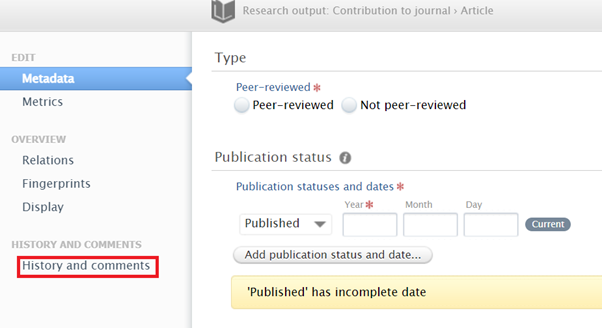Guidance for authors on making research outputs open access unde our rights retention approach. See our general advice on publishing open access (OA).
Together, the Code of Practice for Research and the University Research Publications Policy require that authors of Research Publications retain sufficient rights to enable the reuse of such publications in day-to-day University business such as research and teaching, and so that they can be made OA as follows, with a few defined exceptions.
Publications reuse requirements
Journal articles and conference papers
Research monographs, edited volumes, a chapter in an edited volume
Where author opts in to policy:
- Open access timing: within two years of publication (shorter if required by funder).
- Open access licence: any Creative Commons licence.
Rights Retention applies to the Author Accepted Manuscript (AAM) rather than the final published version of an output. See further information about the correct version to upload to Pure. Authors should follow the steps below when publishing a research output.
Journal articles and conference papers
If you are expecting the published version to be OA, you should still follow these steps. Libraries and Learning Resources will ensure that the most suitable OA version is made publicly available via Pure.
- Before you submit a paper: the University has given notice of the policy to journal and conference publishers that have published University of Birmingham affiliated articles over the past ten years. If you are targeting a new or highly-specialised publisher, check the list of contacted publishers (staff only) and notify Libraries and Learning Resources at openaccesspublishing@contacts.bham.ac.uk of any unlisted publisher. We will give notice to the publisher, and/or recommend inclusion of a Rights Retention statement, depending on the urgency of your submission.
- When you submit a paper: you must ensure your submission includes a Data Access Statement.
- When the paper is accepted: Ensure that you deposit the AAM in Pure as soon as you receive it. See further instructions for depositing in Pure. If you require all information about the article to be supressed until publication due to a press embargo, please add a note in the "History and Comments" section of the Pure record to that effect.
- If a paper is rejected on the grounds of the rights retention obligation: let Libraries and Learning Resources know at openaccesspublishing@contacts.bham.ac.uk so we can provide advice and update our guidance for other authors. While it may ultimately be necessary to seek an alternative journal, we will:
- review whether the publisher offers a transitional agreement or if funds are available to support making the final published version open access, in which case there should be no objection to rights retention,
- advise whether an exception (see section below) could be applied.
Unless an exception has been noted in the relevant Pure record (see below), Libraries and Learning Resources will automatically make the AAM of any journal article or conference paper, either manually uploaded or automatically ingested into Pure, open access under a Creative Commons Attribution (CC BY) licence as soon as its first online publication.
Exceptions: journal articles and conference papers
The Research Publications Policy includes two exceptions which permit authors to opt out of the specific CC BY licence requirement for journal articles. However, it is the author’s responsibility to ensure that using a different licence does not contravene the open access policy of any funder acknowledged on the paper. So long as it does not compromise a funder mandate or Research Excellence Framework (REF) compliance an author:
- may apply a less permissive Creative Commons licence to the AAM up to CC BY-NC-ND.
- may apply an alternative licence which permits the same level of reuse, for example an Open Government Licence.
To apply an alternative licence, choose the applicable licence when depositing in Pure and add a note to the record using the "History and Comments" section.
Screenshot of "History and Comments" section in Pure

Long-form outputs: research monographs, edited collections, chapters and research reports
As open access publishing is far less established for long-form outputs, rights retention is on an opt-in basis. Nevertheless, there are some requirements all long-form authors must abide by.
All long-form outputs
Outputs with a funder mandate for OA or outputs where author requires OA
Assuming funding is unavailable to pay for the version of record to be OA:
- Decide on the appropriate Creative Commons licence (we recommend CC BY, but any CC licence is acceptable) and any embargo period (up to two years) that should be applied before the output is made open access. You may wish to consult with prospective publishers and should also check that your choice is compliant with any funders acknowledged in the work.
- When you submit a manuscript or proposal, you should include the following statement:
"In compliance with the UOB Research Publications Policy, the author(s) has granted a [insert chosen Creative Commons licence] licence to the copyright and all other rights in the nature of copyright subsisting in any post peer review manuscript arising from this submission. The post peer review manuscript will become publicly accessible [immediately on / X months from] first online publication".
- Once the output is accepted for publication, deposit the AAM, or equivalent post-review manuscript, in Pure prior to publication. You will need to choose the appropriate licence that should be applied to the document and identify any required embargo period using the "History and Comments" section.
- If the output is rejected on the grounds of rights retention:
- Inform Libraries and Learning Resources so we can update our guidance for other authors. We can also offer advice with further discussion with a publisher and/or whether any funder associated with the output may support the payment of fees to make the final version open access. Please note we do not have any central funds to pay for long-form open access.
- Consider whether your funder has any exceptions that may apply. Libraries and Learning Resources can advise on potential exceptions.